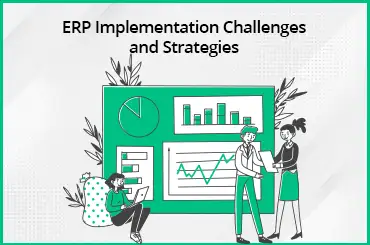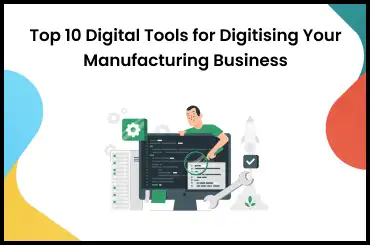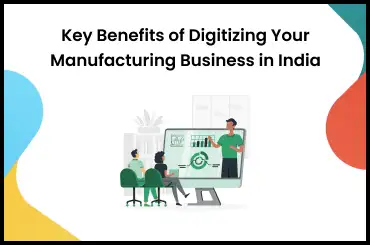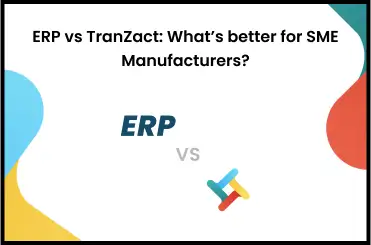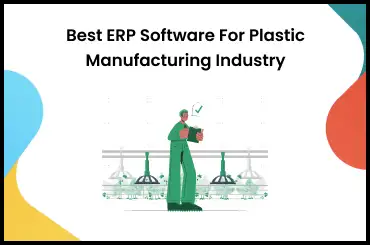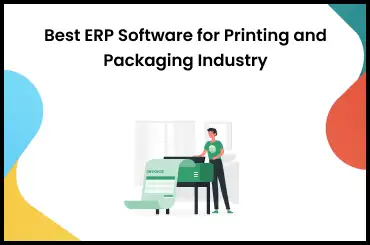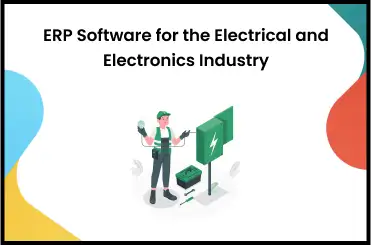There are some key advantages and disadvantages of ERP that one must know before aligning the use of ERP software with their business operations. Although an effective Enterprise Resource Planning (ERP) solution can prove beneficial in many ways, it can be feasible for businesses to leverage only if it is properly evaluated.
Let's understand the importance of ERP and its disadvantages before deciding whether or not to invest in it.
Advantages of ERP System
ERP system is a helpful business management software to efficiently manage and automate business processes. However, choosing the right system depends on your business goals. If you are still thinking about the effectiveness of ERP for your business, the following benefits of enterprise resource planning will help you make an informed decision.
Complete Business Management Solution
Business process management software, such as ERP, allows businesses to manage all aspects of their business, such as accounting, production, sales and marketing, logistics, project management, and more.
ERP integrates all important information about a business, tracks business resources efficiently, facilitates information flow, manages communications, and ensures the accuracy of transactions.
Cost-Saving
Integrating ERP with your business operations can significantly improve efficiency while reducing the probability of errors. Another significant advantage of ERP software is it reduces paperwork and repetitive tasks, thus saving time and money. Hence, it cuts expenses for administrative needs.
Also, this resource planning software makes it easier for businesses to keep a tab on product shortages and overcome logistical problems. Therefore, efficient utilization of the right resources can save a lot of money.
Improves Scalability and Flexibility
One key advantage of ERP software is its ability to modify as per the increasing scale of the business. For example, if the business is scaling and adding new products resulting in more people and production expansion, the ERP system can be modified as per the changing needs. Flexible ERP software enables seamless integration of even the smallest changes in business management and operations.
The changes can be as routine as the addition of new inventory, the hiring of employees, the expansion of production, and other departments. Thus, leading to a more efficient and streamlined business process.
Better Transactions Accuracy
A company can find it simpler to maintain precise records of its financial transactions with the help of an ERP model. Thus, it helps you to keep track of the money you have received from customers, payments to suppliers, and expenditures. You will not miss any records and will be able to improve your business transactions with time.
Centralizes Information
Another benefit of an ERP system is that it streamlines all the information in one place, from various departments, such as manufacturing, sales, suppliers, or customers. Thus, it will reduce the need for regular inspection while eliminating the duplicity of data. It also helps in better decision-making through transparency of business data.
Also, the installation of ERP can help you improve the supply chain and inventory management. It will further optimize performance at all organizational levels and make it easier for your business to access personnel or process information from any relevant department.
Improved Customer Service
Superior customer experience is paramount for every business. Hence, it is significant that companies adopt the right tools and technology that can help them boost customer support. One of the biggest advantages of an ERP system is that its customer relationship management (CRM) module helps to manage and enhance issue resolution with customers and improve their satisfaction levels. It will help you analyze data about customer behavior patterns, which further contribute to preparing sales strategies and improving customer service.
Better Communication and Coordination
The use of an ERP system enhances communication and collaboration between business departments. It can hold all data relevant to the business in one place. Thus, a company can implement ERP software to reduce communication lags and increase productivity. It improves communication with other departments and encourages good teamwork.
Networking and Security
ERP systems are an ideal tool for companies to improve their information security. It can help to store critical financial data and customers' personal information safely and securely. Businesses can use ERP software to share information about customers, suppliers, and financial transactions. Companies can also store non-sensitive data on their external servers.
Higher Management Performance
By installing ERP software, companies can manage all key aspects of business operations, such as production, sales, customer support, inventory, human resources, and supply. It works as a data center where businesses can efficiently handle and automate all data types.
ERP solutions' importance is reducing paperwork and the requirement for regular data entry. It will also decrease human errors, which can disrupt production and supply chain management.
Increases Business Efficiency
An enterprise resource planning system can lessen the time and effort needed by employees to complete daily tasks, lowering technology and training expenses. A well-integrated ERP solution removes tedious manual operations, allowing team members to concentrate on more important and revenue-affecting duties.
One of the notable benefits of ERP software is that it will assist companies in managing business processes like purchase order creation and tracking of products from manufacturing to delivery. Increased efficiency leads to shorter lead times, a more transparent supply chain, better demand forecasts, and business growth.
Disadvantages of ERP System
Learning about these drawbacks of ERP can help you to increase ERP effectiveness and use it for better business results.
High Installation and Maintenance Costs
One of the limitations of ERP is that it can be challenging for businesses to install and maintain an ERP system independently unless it's designed in that way. Businesses may need the assistance of a professional ERP solution provider for maintenance and to solve any other issues that may arise.
They may also require routine updates that could add to the cost. While these investments will eventually pay off with increased business efficiency, it's important to assess the value of these costs and how frequently are they going to be incurred.
Investment in Staff Training
One more limitation of ERP solutions is that they may require staff training to understand complex functionalities. Another disadvantage of ERP is that new hires need to be given complete training about the company's ERP system from scratch when experienced ERP users leave.
To avoid these challenges it's important to ensure that the ERP system is very easy to use by all team members and does not involve highly complex features.
Compatibility Issues
The ERP systems are as effective as the software they run on. However, all the company's existing software and applications may not be compatible with the new ERP system. It could result in mistakes and information loss, making it challenging for a company to carry out its business operations.
Therefore, you should ensure that the ERP software you adopt, is able to integrate easily with your existing business tools and applications.
Requires Specific Adjustments
When ERP software is installed, it demands careful and exact adjustments, ranging from major customization to fine-tuning. On all management levels, ready-to-use solutions must be customized and adjusted to meet the company's management structure. You should configure the features and modify ERP software to suit your company's requirements.
Investing in ERP Is Worth It!
Do assess your business requirements and objectives before going ahead with the implementation of ERP. The advantages and disadvantages of ERP discussed here will help you make the right decision.
TranZact's cloud-based software simplifies SME manufacturing through its exceptional ERP functionalities. It specializes in managing inventory, production , purchase, sales, resource planning , and more. It also provides advanced reporting and business intelligence features. Its features maximize return on investment and productivity for your business year on year!
FAQs on Advantages and Disadvantages of ERP
1. Will the ERP system work for my business?
An ERP system may be expensive but considering its advantages, it is surely worth it. Choose a feature-rich ERP software after understanding all its functionalities and how it will help you handle business operations smoothly. You can weigh the advantages and disadvantages of ERP to determine whether it is right for your company.
2. What type of business can benefit from ERP software?
Several types of businesses can benefit from ERP software, including manufacturing businesses, construction, healthcare, service sector, industries, and more. Be sure to evaluate the advantages and disadvantages of an ERP system before you invest in the software.
3. What are the features and functionalities of ERP?
One of the significant advantages of enterprise resource planning is that it automates business processes while reducing the probability of errors. Moreover, it streamlines invoicing, payroll management, reporting, and other admin activities that may otherwise become time-consuming.








